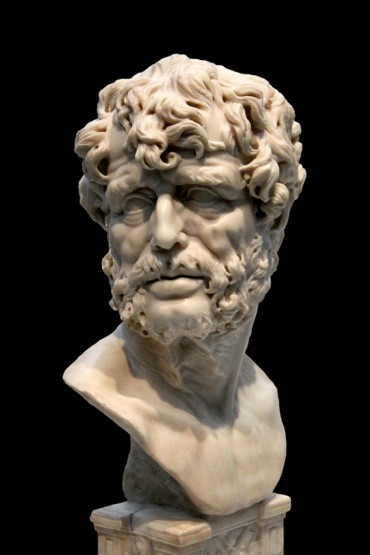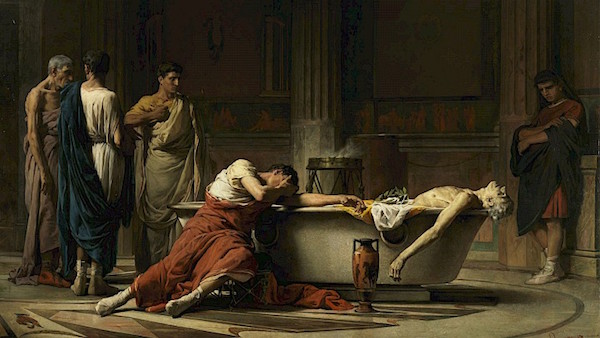Okay, so we are going to be talking about some pretty heavy stuff today. For starters, we are going to examine the looming prospect of our inevitable demise, our inability to picture time as a limited resource, and our unhealthy obsession with frittering our years away enthralled to our labors.

Seneca the younger, who is the author of
On the Shortness of Life is not one of those philosophers to tackle insubstantial questions. As a stoic, he was committed to nothing short of a societal revolution that would see people abandon their superficial ways and embrace the tenents of stoicism not merely as food for thought, but as a viable way of life.
The problem with societal revolutions is that they can be kind of hard. It is likely then that the stoics, who were nothing if not flexible, decided that the best way to endow stoicism upon the Roman population would be to supplant the philosophy within the minds of Rome’s most notable figures.
It is possible that it was this thought that prompted Seneca to take a position as the tutor, and later an advisor, to a young Emperor Nero. Seneca wrote extensively to the young emperor, attempting to spur him in the direction of philosophy and away from political demagoguery.
Now I’m not going to spoil the ending for you, but let’s just all agree that it didn’t really work out. Nero has been called a lot of things, but a “thoughtful, philosophical leader” was never one of them.
But now I am getting away from the subject at hand. We were talking about Seneca’s letter known as On the Shortness of Life or De Brevitate Vitae. The letter is addressed to Seneca’s friend, Paulinus who held the rather important position of supervisor of Rome’s grain supply.
As I mentioned, Seneca touches on a few topics that, at the very least, might make you feel a bit uncomfortable. For starters, Seneca tells us that most people refuse to accept the prospect of death and that we waste our lives on useless endeavors as a way to blind ourselves from the inevitable.
And so I thought it might be a good idea if we started with a joke instead, preferably one about the unavoidable darkness that awaits us all.
A priest stands before his congregation and warns them of the brevity of life and the suddenness of death. He declares to them all, “Before this day is done someone in this very parish might be dead!”
A little old woman in the front row stands up and shouts “Ha!”
“What is so funny?”, asks the priest.
“Well” said the old woman, “I’m not a member of this parish!”
Now that joke is from the book Heidegger and a Hippo Walk Through Them Pearly Gates, by Thomas Cathcart and Daniel Klein, and it accentuates one point very well.

Most of us, if not all of us, do not accept that we are going to die. Oh sure, we can come to grips with the notion of death in a quasi-objective, 21st century-rationalist sort of way. We have empirically concluded that everybody from Sinatra to Seneca was once alive and now they are dead, so it logically follows that we will die as well.
However, we usually don’t KNOW that we will die. We don’t always BELIEVE that we will die with the same conviction that we believe that the sun will rise tomorrow or that our favorite sports teams will be forever cast into obscurity. Seneca tells us as much when he writes…
“You live as if you would live forever; the thought of human frailty never enters your head, you never notice how much of your time is already spent.” -Seneca (On the Shortness of Life)
Seneca argues that we fall into this delusion of believing that we shall live forever. We treat every day as if there would assuredly be another to follow. We view time as if it were an unlimited resource rather than a restricted commodity.
Seneca continues by telling us that we not only refuse to accept our limited time, but that we waste away what little time we do possess. The philosopher declares that we shackle ourselves to our labors, our professions.
Whether we are laborers or emperors, we willingly give parts of ourselves to others or to the faceless masses. And at the end of our days, we might drop dead while calling on a customer or arguing before a court. We will die as if we were children, never having learned how to live.
“How seldom you have enjoyed full use of yourself, how seldom your face wore an in artificial expression, how seldom your mind was unflurried, what accomplishments you have to show for so long a life, how much of your life has been pilfered by others without your being aware of it, how much of it you have lost, how much was dispensed on groundless regret, foolish gladness, greedy desire, polite society-and then realize that your death will be premature.” -Seneca (On the Shortness of Life)
In short, Seneca is telling us that we don’t want to be the kind of guy who dies, and upon his gravestone it is written “He always filed his expense reports”.

As if to accentuate this point, Seneca begins to speak of Emperor Augusts who was deified by the Roman population, but who would be burdened by the responsibilities of his post. Seneca tells us that Augusts longed for the leisure that might come with old age, and that it was this thought alone that gave solace to his labors.
We then might be sorrowful to think of Augusts on his deathbed and that his final words were “Did I play the part well? Then applaud as I exit”, as if his life were a role he played for the benefit of the audience.
Seneca continues that even Cicero, who is remembered for posterity as one of Rome’s greatest politicians and orators, declares in a letter to his friend, Titus Pomponius Atticus that he feels as if he were “half a prisoner” while lounging in his Tuscan estate.
Perhaps it is because he was so entangled within his duties, so burdened by his commitments and authority, that even while in leisure Cicero felt as if he were a prisoner. And that, at least according to Seneca, is no way to live.
Okay, so we haven’t been discussing the most pleasant topics. So far Seneca has reminded us that we are all going to die and then he accused us of wasting our mortal life on professional endeavors.
So what should we be doing?! Give me a sign, Seneca! I want to live, Clarence!
Well, Seneca is, after all, a stoic philosopher at heart. So he tells us that the way we can learn to truly live is to, obviously, study philosophy! Seneca states rather bluntly that “The only people really at leisure are those who take time for philosophy. They alone really live.”
“Only men who make Zeno and Pythagoras and Democritus and the other high priests of liberal studies their daily familiars, who cultivate Aristotle and Theophrastus, can properly be said to be engaged in the duties of life.” -Seneca (On the Shortness of Life)
It is important to remember that philosophy during the time of Seneca was not part of a structured course curriculum at a university. Seneca is not telling us that, if we want to learn to live, then we ought to go enroll in philosophy 101 at our local college.
Instead, we must realize that “philosophy”, at least according to Seneca, was a very conscious and deliberate pursuit of knowledge and wisdom. It is only by endeavoring to uncover true wisdom that we are properly engaged in the duties of life.
This sort of sentiment is to be expected, especially when we remember that Seneca was a stoic philosopher. The Stoics taught that we ought to live according to nature, that humans ought to live according to our human nature. And it is our ability to learn and become wise that is most natural and most pleasant within our lifetime.
“There is nothing that the lapse of time does not dilapidate and exterminate. but the dedications of philosophy are impregnable; age cannot erase their memory or diminish their force.” -Seneca (On the Shortness of Life)
I do have a small objection to this whole pursue-philosophy-or-you-are-not-really-living thing. Keep in mind that the person Seneca is addressing this letter to is responsible for managing the entirety of Rome’s public grain supply. Arguably, this man is the one chiefly responsible for ensuring that citizens are fed and that starvation and famine don’t run wild through the city.

And yet, here Seneca is arguing that being shackled to such responsibilities is no way to live ones life. If I had a family to feed back then, I would have been none too happy to hear that Seneca was attempting to incite an existential crisis within the man responsible for feeding an entire society!
Try to imagine if the entire IRS or the FDA collectively through up their hands and said “Screw this stuff, I’m going to go learn philosophy!” Yeah, you bet their would be some consequences.
Still, the heart of Seneca’s message is one I can support. And if you are looking for a bottom line, then here it is- we ought not to fear death, but accept it as an inevitable conclusion to life. Live every day as if it were your last, because it might just be.
Remember to put aside the expense reports and shut your computer every once in a while (a piece of advice that I have a hard time following) and take some time to live, really live your life.
We ought not to languish about our lot in life, but rather take time to cultivate our inner selves. And when we die, and die we will, we should die content with our lives, with ourselves, and with the beauty of our souls.
 Seneca the younger, who is the author of On the Shortness of Life is not one of those philosophers to tackle insubstantial questions. As a stoic, he was committed to nothing short of a societal revolution that would see people abandon their superficial ways and embrace the tenents of stoicism not merely as food for thought, but as a viable way of life.
Seneca the younger, who is the author of On the Shortness of Life is not one of those philosophers to tackle insubstantial questions. As a stoic, he was committed to nothing short of a societal revolution that would see people abandon their superficial ways and embrace the tenents of stoicism not merely as food for thought, but as a viable way of life.
 As if to accentuate this point, Seneca begins to speak of Emperor Augusts who was deified by the Roman population, but who would be burdened by the responsibilities of his post. Seneca tells us that Augusts longed for the leisure that might come with old age, and that it was this thought alone that gave solace to his labors.
As if to accentuate this point, Seneca begins to speak of Emperor Augusts who was deified by the Roman population, but who would be burdened by the responsibilities of his post. Seneca tells us that Augusts longed for the leisure that might come with old age, and that it was this thought alone that gave solace to his labors.










One comment
Here’s the first audio version of this classic work by Seneca http://www.amazon.com/On-the-Shortness-of-Life/dp/B01282379S
Trackbacks
Our apologies, you must be logged in to post a comment.